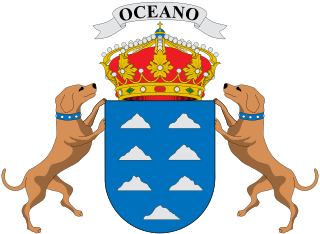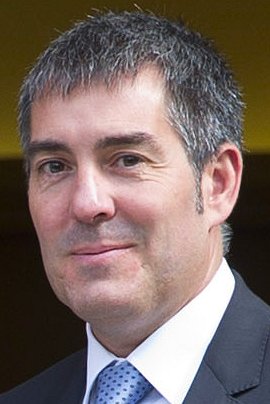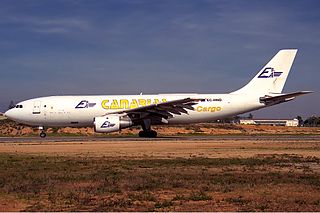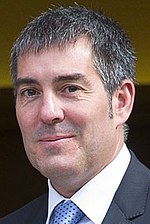
The Canary Islands, also known informally as the Canaries, are a Spanish autonomous community and archipelago in Macaronesia in the Atlantic Ocean. At their closest point to the African mainland, they are 100 kilometres west of Morocco. They are the southernmost of the autonomous communities of Spain. The islands have a population of 2.2 million people and are the most populous special territory of the European Union.

The Presa Canario is a Spanish breed of large dog of mastiff or catch dog type. It originates in the autonomous region of the Canary Islands, and is found mostly in the islands of Gran Canaria and Tenerife. It was formerly known as the Dogo Canario. It was traditionally used as a guard dog, as a herding dog for both sheep and cattle, and for dog-fighting, which was legal in Spain until 1936 and may have continued clandestinely thereafter.

The president of the Canary Islands is the head of government of the Canary Islands, one of the 17 autonomous communities of Spain, while the monarch Felipe VI remains the head of state as king of Spain.

The 2015 Canarian regional election was held on Sunday, 24 May 2015, to elect the 9th Parliament of the Autonomous Community of the Canary Islands. All 60 seats in the Parliament were up for election. The election was held simultaneously with regional elections in twelve other autonomous communities and local elections all throughout Spain.

Euro First Air - Canarias Cargo, also known as EFA - Canarias Cargo or simply Canarias Cargo, was an airline based in Las Palmas, Canary Islands, Spain.

The third Revilla government was a regional government of Cantabria led by President Miguel Ángel Revilla. It was formed in July 2015 after the regional election and ended in July 2019 following the regional election.

The Ceniceros government was the regional government of La Rioja led by President José Ignacio Ceniceros. It was formed in July 2015 after the regional election and ended in August 2019 following the regional election.

The Second Fernández Vara Government was the regional government of Extremadura led by President Guillermo Fernández Vara. It was formed in July 2015 after the regional election and ended in July 2019 following the regional election.

The first López Miras government was a regional government of Murcia led by President Fernando López Miras. It was formed in May 2017 after the resignation of López Miras's predecessor Pedro Antonio Sánchez and ended in August 2019 following the regional election.

The fifth Herrera government was a regional government of Castile and León led by President Juan Vicente Herrera. It was formed in July 2015 after the regional election and ended in July 2019 following the regional election.
This is the results breakdown of the local elections held in the Canary Islands on 26 May 2019. The following tables show detailed results in the autonomous community's most populous municipalities, sorted alphabetically.

The Torres government was a regional government of the Canary Islands led by President Ángel Víctor Torres. It was formed in July 2019 after the regional election.

The Andreu government is the incumbent regional government of La Rioja led by President Concha Andreu. It was formed in August 2019 after the regional election.

The 2023 Canarian regional election was held on Sunday, 28 May 2023, to elect the 11th Parliament of the Autonomous Community of the Canary Islands. All 70 seats in the Parliament were up for election. The election was held simultaneously with regional elections in eleven other autonomous communities and local elections all throughout Spain.

The Second Javier Fernández government was the regional government of Asturias led by President Javier Fernández. It was formed in July 2015 after the regional election.

Cristina Valido García is a member of Canarian Coalition who serves as the party's deputy in the Spanish Congress of Deputies since July 2023. In 2017, Valido served as the counselor of employment and politics in the government of the Canary Islands under President Fernando Clavijo Batlle.
Sara Alba is a Spanish politician from the Socialist Party of La Rioja. A member of the Socialist Party, she served as Minister of Health in the Government of Concha Andreu from 30 August 2019 until her dismissal in January 2022.
The Government of the Canary Islands is the institution that holds the executive power within the competence framework of the autonomous community of the Canary Islands, in Spain, conferred by the Statute of Autonomy of the Canary Islands.

The Second government of Fernando Clavijo was formed on 15 July 2023, following the latter's election as President of the government of Canary Islands by the Parliament of the Canary Islands on 12 July and his swearing-in on 14 July, as a result of Canarian Coalition (CCa), the People's Party (PP), the Independent Herrenian Group (AHI) and Gomera Socialist Group (ASG) being able to muster a majority of seats in the Parliament following the 2023 Canarian regional election. It succeeded the government of Ángel Víctor Torres and has been the incumbent Government of the Canary Islands since 21 July 2023, a total of 43 days, or 1 month and 12 days.



















